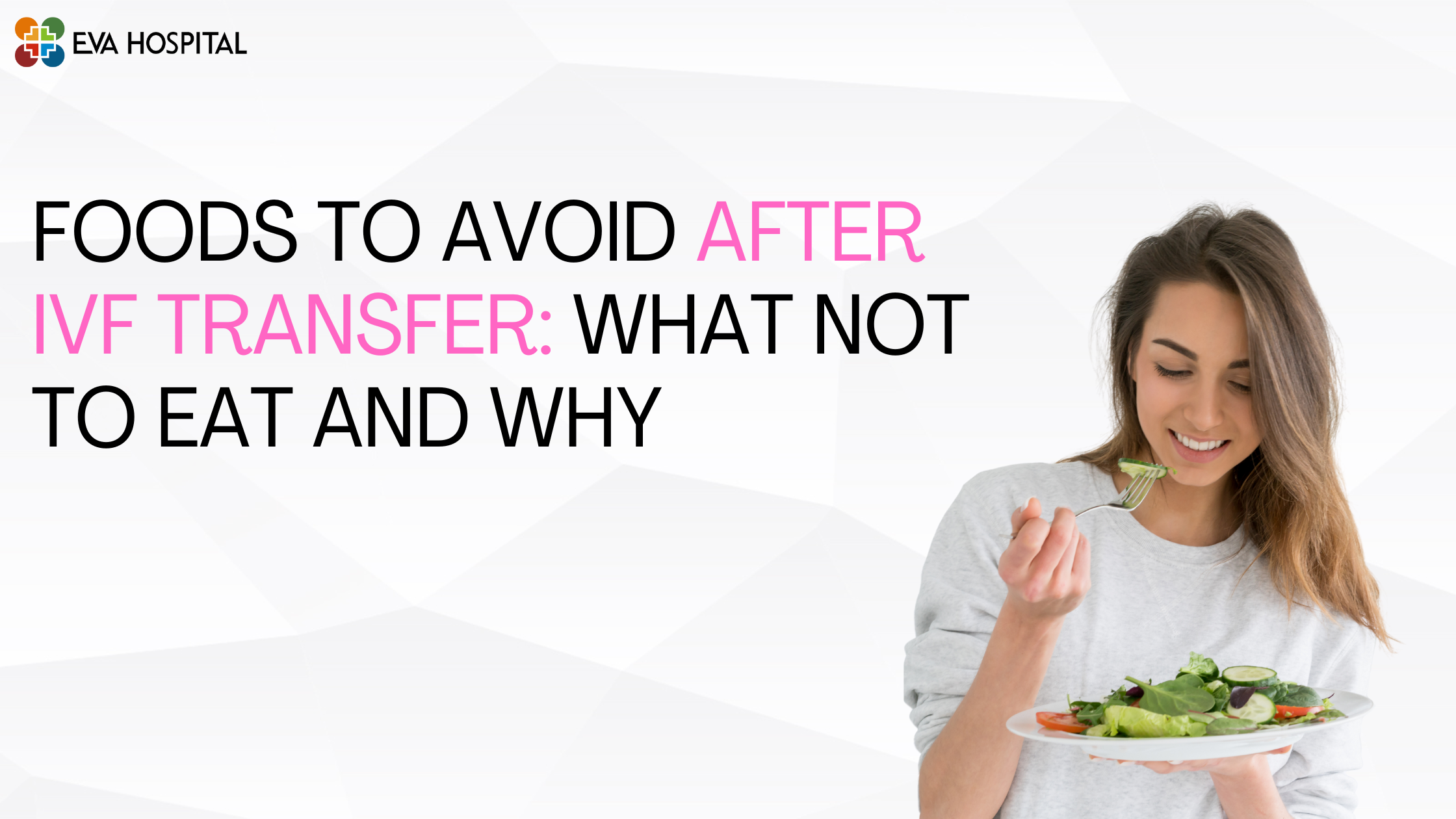Summary
Your post-IVF embryo transfer diet will be very crucial in helping to sustain the implantation and early pregnancy. Certain foods have a negative impact on the hormonal state and inflammatory process or are a source of infection; all these can lead to a negative association with the success of your IVF cycle. So keep yourself updated with Foods to Avoid After IVF Transfer.
This article proposes to outline the foods to avoid after undergoing IVF and highlights the reasons why one should avoid consuming these foods, as they will work sequentially in producing the most conducive environment in which the embryos will thrive.
Introduction To Foods to Avoid After IVF Transfer
Initiating an IVF program involves an exciting combination of optimism and difficulty. Following such a sensitive process of transferring the embryos, one would desire to encourage the body to conceive the embryos to stick and grow.
Hi, I am Dr Shivani Bhutani, I am back with another topic to guide my readers with the foods that they should not eat after IVF transfer. Earlier, i educated my readers about eating dragon fruit in pregnancy. In the meantime, in all these times, general healthy foods are always necessary, but these are special foods which ought not to be consumed after the embryo transfer to enhance success.
1. Alcohol: A Strict No-No
Alcohol is not advised and need not be included in the IVF transfer diet, as in case it could disrupt the hormones, and it could possibly interrupt the implantation of the embryos as well. Rather than seeking help for alcohol, alternatives that do not contain alcohol should be sought to assist reproductive health in this precarious stage.
2. Caffeine: Moderation is Key
There are effects on hormones if taken in overdoses of caffeine, whereas alcohol could pose a risk to the very young gestating embryo. Hence, it is advisable to completely avoid or stay away from it in small intakes.
3. Raw or Undercooked Meats and Seafood
The Foods to Avoid After IVF Transfer include Undercooked meats or seafood are bad at any time, but it is particularly important that raw or cooked meats or seafood be avoided after an embryo transfer or during pregnancy. Such foods may result in a bacterial (such as E. coli or Listeria) or a parasitic infection that may end in a miscarriage.
4. Unpasteurized Dairy Products
As per my experience following the foods for successful IVF, unpasteurized dairy items can carry food safety hazards with bacteria such as Listeria, which are food poisoning agents and can pose a risk to pregnancies. So, for safety purposes, it is best to pick the pasteurized kind. Not only foods are important to take care after you have followed IVF, but taking care of various body position after embryo transfer is also important.
| Food Category | Impact on IVF Success | Reason for Avoidance | Percentage of Impact on IVF Success |
|---|---|---|---|
| Alcohol | High | Disrupts hormone balance and reduces chances of embryo implantation. | 30% |
| Caffeine (Excessive) | Moderate | Interferes with hormone levels, reducing the likelihood of successful implantation. | 20% |
| Raw or Undercooked Meats | High | Risk of bacterial or parasitic infections, increasing miscarriage risk. | 25% |
| Unpasteurized Dairy | High | Can carry bacteria like Listeria, which may cause pregnancy complications. | 20% |
| High-Mercury Fish | Moderate | Mercury can negatively affect fetal development. | 15% |
| Processed and Junk Foods | Moderate | Inflammation caused by artificial additives and preservatives. | 10% |
| Sugary Treats & Beverages | Moderate | Increases insulin spikes and inflammation, affecting reproductive health. | 15% |
| Artificial Sweeteners | Low | May disturb gut health and hormone balance. | 10% |
| Full-Fat Dairy Products | Moderate | Can increase body inflammation, affecting implantation success. | 15% |
| Undercooked Eggs | High | Risk of foodborne illness, leading to potential pregnancy complications. | 20% |
5. High-Mercury Fish
Swordfish, mackerel, and tuna fish are some of the fish that contain lots of mercury, which can hamper the development of the fetus. Alternatively, safer options would be salmon, trout, and sardines.
6. Processed and Junk Foods
Artificial additives and preservatives in processed foods cause our bodies to react with inflammation. These are the processed foods to name a few: retail packaged snack foods, chips, ready-to-eat products, processed meats, refined sugar products, and artificial sweeteners. It is good to avoid them for implantation health
7. Excessive Salt Intake
Excessive salt consumption may require water to be retained, leading to bloating and discomfort during the post-IVF transfer. For your post-IVF implantation food, regulation of the intake of foods containing high amounts of sodium, like processed food items like snacks, ready-made food stuff, packed soup, and cold cuts, aids in the balance of fluid and the favoring of reproductive health.
8. Sugary Treats and Beverages
Sugar-related inflammation and insulin spikes interfere with hormone levels and reproductive capacity; hence, it is advisable to stay away from sugary treats, especially in this critical phase. This would include desserts, candies, ice cream, cakes, pastry, and sugary drinks. It supports maintaining flat sugar levels.
9. Artificial Sweeteners
Artificial sweeteners found in diet sodas, sugar-free snacks, and many processed foods might be disturbing to gut health and fertility. For the sake of reproductive health, it is best to look away from artificial sweeteners after passing the IVF transfer.
10. Full-Fat Dairy Products
Dairy products with full fat may induce inflammation in the body, which may disturb the process of implantation. Use watered-down milk or dairy products such as almond milk and coconut milk.
11. Undercooked Eggs
Uncooked or poorly cooked eggs carry Salmonella, a bacterium that leads to food poisoning. It’s advisable to avoid consuming raw or undercooked eggs during the post-IVF transfer period to reduce the risk of foodborne illness.
Additional Dietary Considerations
- Hydration: Maintain adequate hydration by drinking plenty of water throughout the day.
- Fiber Intake: Consume a fiber-rich diet to prevent constipation and support overall digestive health.
- Small, Frequent Meals: Opt for smaller, more frequent meals to support digestion and overall well-being.
Conclusion
Do follow post-IVF care, as a normal diet has a lot of importance in post-embryo transfer care. The risks of not getting implanted and being unable to carry a pregnancy to the end can be reduced by simply avoiding certain foods. A healthy, nutritious diet must be adopted, and in case of individual consultation, professional consultancy is available in fertility centres. Now me signing off, will meet you all in my next blog, till then enjoy healthy eating.
Frequently Asked Questions (FAQs)
Your body requires a stable, healthy environment for implantation. Certain foods promote hormone balance, reduce inflammation, and increase uterine receptivity.
Yes, provided you drink it in moderation-that is, not more than 200mg a day. Drinking more might disturb hormone levels, thus reducing the chances of implantation.
Low-mercury fish are good: for example, salmon or sardines. But avoid tuna, swordfish, and mackerel.
Though not harmful directly, spicy foods can irritate the digestive and cause discomfort. It is best to eat foods that are mild and easy to digest.
For at least 2 weeks after the transfer or until pregnancy has been confirmed, it should be maintained. Healthy eating should be continued through early pregnancy.


